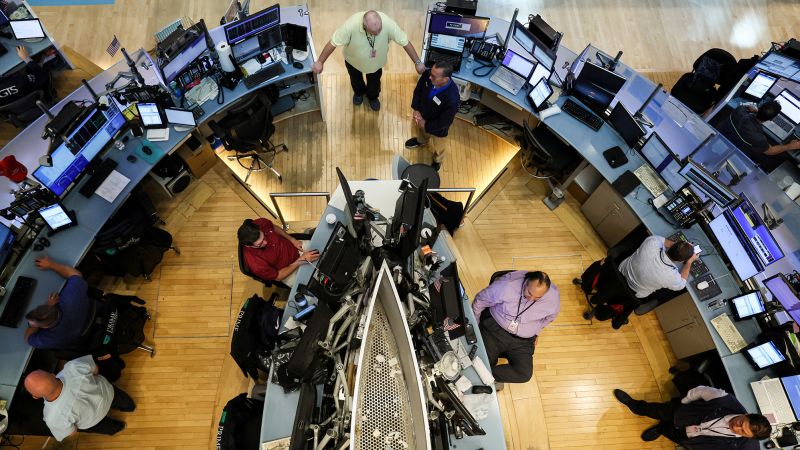


A version of this story first appeared in CNN Business’ Before the Bell newsletter. Not a subscriber? You can sign up right here. You can listen to an audio version of the newsletter by clicking the same link.
New York CNN —
As the second-quarter earnings season kicks off this week, investors want answers on the health of the United States’ companies and its economy.
The projected second-quarter earnings decline for companies listed in the S&P 500 is roughly 7.6% compared to the prior year, according to FactSet. That would be the third consecutive quarter of declines and the largest earnings decline reported by the broad-based index since a roughly 32% loss during the second quarter of 2020.
But investors will be looking even more closely at what companies forecast for their financial performance and the broader economy. That will be more important than backward-looking earnings results in determining whether this year’s rally can continue, and whether the economy is headed for a downturn.
“Guidance and insights into company cost structures that determine profit margins are likely to have the greatest impact on investor sentiment,” US Bank Wealth Management strategists wrote in a report on Monday.
The S&P 500 has gained about 16% for the year, buoyed by hype around artificial intelligence that’s driven tech stocks to stratospheric heights and an economy that’s stayed resilient despite the Federal Reserve’s aggressive pace of interest rate hikes.
The economy has shown little signs of slowing this year. Gross domestic product, the broadest measure of economic output, rose at an annualized rate of 2% in the first quarter, up from a second estimate of 1.3% reported last month.
Retail sales at stores, online and in restaurants increased 0.3% in May from April, above economists’ expectations of a 0.1% decline, according to Refinitiv.
Some investors say the economy’s strength could start to peter out as the Fed continues to raise interest rates and consumers spend savings accrued during the height of the pandemic.
“It’s not a bright picture,” said Paul Eitelman, chief investment strategist for North America at Russell Investments.
Retail behemoths including Macy’s and Costco sent warning bells ringing around a month ago that consumers are tightening their purse strings. Moreover, the US economy added a fewer-than-expected 209,000 jobs last month, outpacing the pre-pandemic average but marking the lowest monthly gain since December 2020.
Investors will search for more signs of consumers’ strength on Friday, when big banks including JPMorgan Chase, Wells Fargo, BlackRock and Citigroup report their quarterly results. Key themes in focus include how credit conditions have tightened, especially after three regional banks collapsed earlier this year, and whether it’s damaged the US economy.
What’s next: Despite low expectations for the second quarter, analysts still expect earnings growth of about 0.2% and 7.7% for the third and fourth quarters of this year, respectively. But of the 267 companies in the S&P 500 that have issued earnings guidance for the year so far, roughly 43% of them have issued a negative forecast.
“It’s just going to be harder and harder for the consumer to remain in a position where they can support economic growth,” said Steve Wyett, chief investment strategist at BOK Financial.
Energy Secretary Jennifer Granholm said the United States will refill the depleted Strategic Petroleum Reserve, reports my colleague Matt Egan.
But there’s a catch — it won’t happen before a second term for President Joe Biden.
“The plan is this term and the next term to be able to do that,” Granholm told CNN.
The Strategic Petroleum Reserve has plummeted to decades lows, as the emergency oil stockpile has shrunk by nearly 300 million barrels since Biden took office, in part to combat gas prices pushed higher last year by Russia’s invasion of Ukraine.
The Energy Department has taken steps to refill the SPR, purchasing 6.3 million barrels of oil for it. Officials expect to secure another six million by August.
While the process to replenish the SPR will likely take years, Granholm reiterated that the SPR has enough supply to brace against potential shocks.
“We still have the largest strategic petroleum reserve in the world,” Granholm said. “We have, by far, enough to be able to deal with any emergencies over the next couple of years.”
Grocery prices were steady in June after rising in May, reports my colleague Danielle Wiener-Bronner.
Food prices ticked up 0.1% for the month, according to the June Consumer Price Index released Wednesday. That’s below the 0.2% increase for items overall from May to June. Still, the rise in food prices has outpaced overall inflation.
Some items that went up in price include uncooked ground beef, breakfast cereal, chicken, flour and fruits and vegetables.
Egg prices continued to drop, after several factors including a deadly bird flu that killed egg-laying hens last year led to a surge in prices.
Food prices rose 6.7% in May from the year prior, with grocery prices jumping 5.8%, the Bureau of Labor Statistics reported last month.
“With groceries in particular, I would say the trend is our friend,” Jared Bernstein, chair of the Council of Economic Advisers, a group that advises the president, told CNN.
